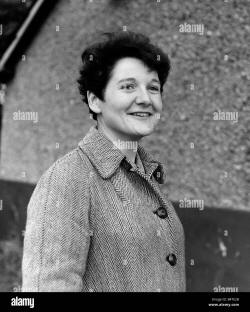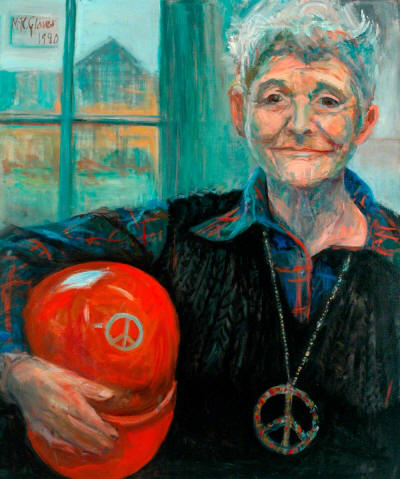Partner Wendy Butlin
Queer Places:
Cheltenham Ladies' College, Bayshill Rd, Cheltenham GL50 3EP, UK
University of Cambridge, 4 Mill Ln, Cambridge CB2 1RZ, UK
 Pat Arrowsmith (born 2 March 1930) has been a prolific English author and peace campaigner.[1][2] She was a co-founder of the Campaign for Nuclear Disarmament in 1957. Arrowsmith was involved in a personal relationship with a fellow peace campaigner, Wendy Butlin
from 1971 to 1976. [8] Butlin was also one of the original signatories for the Committee of 100. Ineligible to qualify for her father's inheritance unless she were married to a man, Arrowsmith married poet Donald Gardner for one day before having the marriage annulled. She then donated some of the money to various political causes, including Gay Pride Week 1979.[3][22][7]
Pat Arrowsmith (born 2 March 1930) has been a prolific English author and peace campaigner.[1][2] She was a co-founder of the Campaign for Nuclear Disarmament in 1957. Arrowsmith was involved in a personal relationship with a fellow peace campaigner, Wendy Butlin
from 1971 to 1976. [8] Butlin was also one of the original signatories for the Committee of 100. Ineligible to qualify for her father's inheritance unless she were married to a man, Arrowsmith married poet Donald Gardner for one day before having the marriage annulled. She then donated some of the money to various political causes, including Gay Pride Week 1979.[3][22][7]
Arrowsmith was born into a clerical family in Leamington Spa as the youngest of three children.[3][4] Her mother was Margaret Vera Kingham and her father Reverend G. E. Arrowsmith.[5]
In 1939 the family moved to Torquay, where Arrowsmith studied at Stover School, before transferring to Cheltenham Ladies College in September 1944. She read history at Newnham College, Cambridge,[6] and then read social science at the University of Liverpool and at Ohio University as a US–UK Fulbright Scholar.[7]
Arrowsmith is a peace campaigner and has worked to campaign for nuclear disarmament, an end to the Vietnam war, the removal of British troops from Northern Ireland, an end to the Gulf War, and feminist and lesbian issues.[8]
Arrowsmith was a co-founder of the Campaign for Nuclear Disarmament and is one of its current vice-presidents.[9] She was one of the organisers of the first Aldermaston march.[10] She was also one of the original signatories of the Committee of 100. From 1958 onwards, she served eleven prison sentences for her political activities.[3] In 1961 she was the subject of parliamentary questions after she was force-fed while on hunger strike in Gateside prison.[11] She also worked for the human-rights organisation Amnesty International for 24 years up to 1994[3] and was the organisation's first prisoner of conscience in Britain.[12]

Pat Arrowsmith (b.1930) with Motorbike Helmet
Margaret Glover (b.1934 or 1935)
Peace Museum
In 1974, Arrowsmith was convicted of offences against sections 1 and 2 of the Incitement to Disaffection Act 1934, and sentenced to 18 months in prison for having handed out leaflets at a British army base, urging soldiers to refuse to serve in Northern Ireland.[13]
On September 7, 1974, Arrowsmith escaped from Askham Grange open prison. After walking out from prison, Arrowsmith spoke at an anti-fascist demonstration in Hyde Park and befriended lesbian and gay attendees. In an interview with the 5 Cally Road research project, Nettie Pollard (a member of the Gay Liberation Front), recalled Arrowsmith saying to LGBT protestors, "Well, why don't we go to Housmans?" The group took sanctuary at the 5 Caledonian Road premises shared by the radical bookshop Housmans and the pacifist newspaper Peace News. Upon arrival, the group contacted The Press Association to say, "there's a fugitive at Housmans, 5 Caledonian Road." Their photographs appeared on the front page of The Sunday Telegraph. When arresting officers appeared at the scene, Arrowsmith refused to walk downstairs and was carried down three flights of stairs.[14][15][16]
In 1975, the Court of Appeal dismissed her appeal, describing her conduct as "mischievous" and "wicked". However, it upheld her appeal against the sentence, reducing it so that she would be immediately released.[17]
Arrowsmith filed a case against the United Kingdom (Arrowsmith v. United Kingdom) in the European Commission of Human Rights, claiming her conviction violated the European Convention on Human Rights' protections of her rights to liberty and freedom of belief and expression. In 1978, the Commission found her conviction "a necessary restriction on the exercise of free speech in the interests of national security and for the prevention of disorder", and so did not violate the Convention.[18]
Arrowsmith was an unsuccessful candidate of the Radical Alliance, a CND splinter group, for Fulham in the 1966 and 1970 general elections.
She stood as an Independent Socialist candidate, campaigning for Troops Out of Ireland and supported by the Trotskyist Socialist Unity party against the then Prime Minister, James Callaghan, in his constituency of Cardiff South-East in the parliamentary general election of 1979.[19] During Callaghan's customary acceptance speech on re-election, Arrowsmith carried on sustained heckling. Callaghan, in an avuncular response to the heckling, remarked that it was the first time he had "conducted a duet in returning a vote of thanks, and that it was not a particularly tuneful duet."[20] He then suggested that Arrowsmith might be invited to take the platform, which she did, while he, his supporters and all the other candidates left the hall. However, her short speech was broadcast on the BBC. It demanded a withdrawal of British troops from Ireland and self-determination for its people.[21]
Arrowsmith has published several novels and works of poetry.[4][23] Her archive and personal papers are held at the LSE Library in London.[7]
My published books:


BACK TO HOME PAGE

 Pat Arrowsmith (born 2 March 1930) has been a prolific English author and peace campaigner.[1][2] She was a co-founder of the Campaign for Nuclear Disarmament in 1957. Arrowsmith was involved in a personal relationship with a fellow peace campaigner, Wendy Butlin
from 1971 to 1976. [8] Butlin was also one of the original signatories for the Committee of 100. Ineligible to qualify for her father's inheritance unless she were married to a man, Arrowsmith married poet Donald Gardner for one day before having the marriage annulled. She then donated some of the money to various political causes, including Gay Pride Week 1979.[3][22][7]
Pat Arrowsmith (born 2 March 1930) has been a prolific English author and peace campaigner.[1][2] She was a co-founder of the Campaign for Nuclear Disarmament in 1957. Arrowsmith was involved in a personal relationship with a fellow peace campaigner, Wendy Butlin
from 1971 to 1976. [8] Butlin was also one of the original signatories for the Committee of 100. Ineligible to qualify for her father's inheritance unless she were married to a man, Arrowsmith married poet Donald Gardner for one day before having the marriage annulled. She then donated some of the money to various political causes, including Gay Pride Week 1979.[3][22][7]


